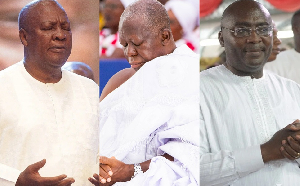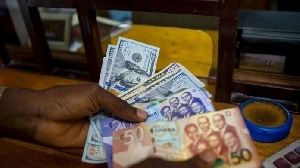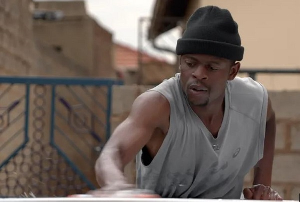Opinions of Wednesday, 20 July 2016
Columnist: Ata, Kofi
Supreme Court's rulings in favor of Zanetor and implications for political parties
The Supreme Court (SC) by a majority of decision (4-1) cleared Dr Zanetor Rawlings to hold herself out as the parliamentary nominee of the National Democratic Congress (NDC) in the forthcoming general elections.
The SC also directed the High Court to deliver a ruling in that regard because an individual can only be a candidate after the Electoral Commission (EC) has opened the opportunity for filing.
The apex court, therefore, said since the EC was yet to take that action, the argument of Dr Rawlings not being eligible did not hold water. (see, “Klottey Korle controversy: Supreme Court Clears Zanetor”, Ghanaweb, July 18, 2016. This article is an analysis of the judgement and the potential implications for political parties in Ghana.
Let me say from the onset that, the SC was wrong in its decision for a number reasons. First and foremost, the apex court misdirected itself in turning the case into an Article 94(1)(a) interpretation of the 1992 Constitution.
Article 94(1) states, “subject to the provisions of this article, a person shall not be qualified to be a member of Parliament unless - (a) he is a citizen of Ghana, has attained the age of twenty-one years and is a registered voter”, There is no ambiguity in the language of Article 94(1)(a) that required interpretation. Therefore, the SC erred in assuming jurisdiction over a case that should been adjudicated by High Court.
Second, the case was not about Article 94(1)(a) but rather the NDC Constitution, which required that in order to be eligible to contest its parliamentary primaries as a prospective parliamentary candidate of the party, party members must be a registered voter in Ghana.
Article 94(1)(a) is therefore antecedent to NDC’s Constitution. For this reason, Article 94(1)(a) cannot be applied prior to NDC’s parliamentary primary requirements. In my view it should be the other way round as the requirement to be a registered voter prior to contesting the NDC’s parliamentary primaries is not inconsistent with Article 94(1)(a). Article 94(1)(a) can only be invoked if NDC’s requirement to be a registered voter breached it.
The SC also erred in law by concluding that Dr Zenator Rawlings is an individual and directing the High Court to rule in her favour so she can hold herself as parliamentary nominee of NDC. The fact of the matter is that Dr Rawlings cannot be described as an individual because she is not an independent candidate but seeking to represent NDC in parliamentary.
In fact, Article 97(1) of the 1992 Constitution states, “a member of Parliament shall vacate his seat in Parliament -(g) if he leaves the party of which he was a member at the time of his election to Parliament to join another party or seeks to remain in Parliament as an independent member; or (h) if he was elected a member of Parliament as an independent candidate and joins a political party.
Dr Zenator Rawlings is therefore no longer an individual but a representative of NDC and for this reason, the SC should have directed its attention to Article 97(1)(g)(h).
Finally, the apex court erred because disqualification of Dr Zenator Rawlings at the NDC primaries for not meeting NDC’s eligibility criteria does not necessarily disqualified her from contesting the parliamentary seat as she could still contest as an independent since she will be a registered voter by the time the EC opens nominations but cannot do so on the ticket of NDC.
Before I consider the implications for political parties, it’s worth noting that I agree with the lone dissenting Justice (JSC Anin Yeaboah) on the earlier ruling of the same court. I refer readers to an article by Dr Poku Adusei entitled “Critique of SC on Zanetor’s Case” (Ghanaweb, June 13, 2016). For easy reference, I reproduce sections of his article (particularly the dissenting Justice’s reasons on the early ruling).
“Anin Yeboah JSC held that “article 94(1)(a) is devoid of any ambiguity in anyway whatsoever.” In affirming earlier Supreme Court decisions in Republic v. Maikankan & Others and Aduamoa II & Others v. Adu Twum II, Anin Yeboah JSC held that the original jurisdiction vested in the Supreme Court to interpret the provisions of the 1992 Constitution was a special jurisdiction meant to be invoked in suits raising genuine and real issues of constitutional interpretation.
He noted that upon a closer reading of the reliefs sought by the Plaintiff at the High Court, it becomes abundantly clear that the High Court was never called upon to interpret article 94(1)(a) of the Constitution. Accordingly, “a mere reference to a provision of the Constitution for a court lower than the Supreme Court to consider would not amount to interpretation as envisaged under articles 2(1) and 130(1) of the1992Constitution.”
Anin Yeboah JSC further highlighted the need for a restatement of the law by clearly distinguishing between the interpretation of a constitutional provision and the application of a constitutional provision in cases which are filed before the Supreme Court.
In the opinion of the dissenting Justice, “the High Court Judge was merely applying the provisions of article 94(1)(a) of the Constitution and no more.” Elsewhere, in the United States of America, the exercise of sieving cases which end up at the Supreme Court is undertaken by a Single Justice. This saves the full panel of the US Supreme Court from hearing a lot of unmeritorious claims”.
Now to the implications for political parties. By this ruling the SC is saying that the rules of engagement as outlined in registered political parties’ constitutions are irrelevant, even when those rules are consistent with the 1992 Constitution.
This can create potential problems and disputes for political parties in the organisation of future parliamentary primaries. The ruling has also weakened political parties and their ability to enforce their rules of engagement. In the end democracy itself could be at risk of confusion.
The most serious implication for political parties would be their presidential primaries. With this ruling, any citizen who meets all the requirements under Article 62 with the exception of not being a registered voter in Ghana could contest the presidential primaries of a political party with the hope that by the time the EC opens nominations for the presidential election s/he would be a registered voter (as membership of political parties does not require meeting Article 94(1)(a) conditions).
Article 62 states, “a person shall not be qualified for election as the President of Ghana unless - (a) he is a citizen of Ghana by birth; (b) he has attained the age of forty years; and (c) he is a person who is otherwise qualified to be elected a Member of Parliament, except that the disqualifications set out in paragraphs (c), (d), and (e) of clause (2) of article 94 of this Constitution shall not be removed, in respect of any such person, by a presidential pardon or by the lapse of time as provided for in clause (5) of that article”.
Are political parties in Ghana aware of this potential future dilemma for them following this ruling and if this unexpected situation happen how would they deal with it?
In conclusion, this ruling is not only bad but also per incuriam (a mistaken decision of a court). It is bad because it appears the decision was so designed because of the personality involved, the daughter of Ex-President Rawlings who is also allegedly supported by the President Mahama and the NDC. I rest my case.














